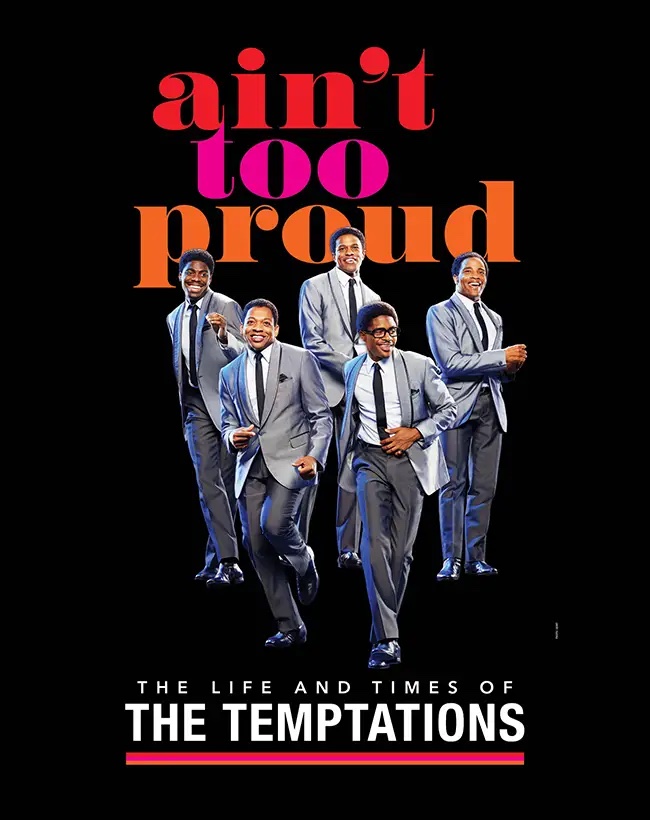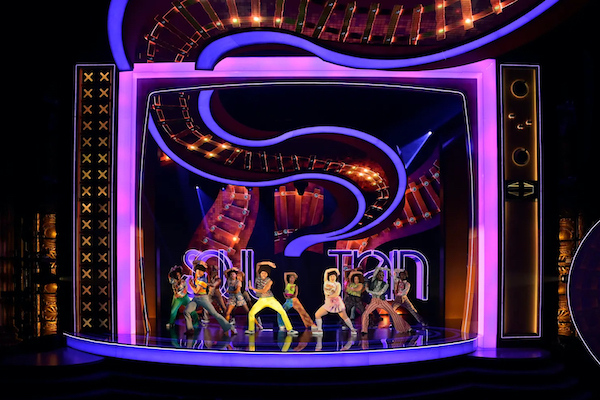
Dominique Morisseau wasn’t interested in working on another jukebox musical after writing the book for “Ain’t Too Proud: The Life and Times of the Temptations,” which debuted at the Berkeley Rep in 2017 and went on to a hit run on Broadway, garnering a dozen 2019 Tony nominations (including Best Book).
And yet this week, she returns to the Bay Area for the premiere production of “Hippest Trip: The Soul Train Musical” for which she wrote the book. The show is playing at ACT’s Toni Rembe Theater through October 8.
Morisseau’s change of heart began with a fortunate coincidence and was fueled by an invigorating musical treasure hunt.
A worthy temptation
Today, Morisseau, 45, is one of the country’s most frequently produced contemporary playwrights, duly celebrated for her Detroit trilogy (“Paradise Blue,” “Detroit ’67,” and “Skeleton Crew,” all of which have had well-received Bay Area productions). She’s also the winner of an esteemed 2018 MacArthur Fellowship.
But the opportunity to join director Des McAnuff’s creative team in developing “Ain’t Too Proud” came before she’d reached these heights of acknowledgement. At the time, Morisseau was supplementing her playwriting and expanding her horizons as a writer and story editor on the gritty Showtime comedy “Shameless.”
Morisseau, who considers herself first and foremost a theater artist, had yet to see any of her work produced on Broadway, which is where “Ain’t Too Proud” was aimed from the outset. (McAnuff initiated Broadway’s 21st Century jukebox avalanche with “Jersey Boys” in 2005).
Having grown up in Detroit, where the Temptations and their record company, Motown, were based, she also felt a personal attraction to the show’s material.
“I’ve been attracted to theater for as long as I can remember,” says Morisseau, “but musicals were not something I particularly loved because, well, because I didn’t love the music.”
Showtunes were not a staple of her formative years.
“But this!” she says, regarding the soul, pop and R&B genres represented in both “Ain’t Too Proud” and “The Hippest Trip,” was music that I heard all the time when I was growing up. It was music that connected to my life and that I like to listen to.”

Morisseau is indeed proud of her work on “Ain’t Too Proud,” especially in regard to its connection of music to broader sociocultural themes. But all the positive attention and opportunities that the show brought her way couldn’t make up for the creative hamstringing that comes with writing a script in service of a specific set of already beloved songs.
“The rule around being a book writer” for a jukebox musical, says Morisseau, “is that if a production is going well, nobody pays much attention to you, and if it’s not going well, everyone’s looking at you. The book writer is very vulnerable in gigs like this.”
Never say never
“After ‘Ain’t Too Proud,’ I said I wasn’t going to do it again,” notes Morisseau about tangling with the pre-existing musical conditions germane to the jukebox genre. Particularly when these shows are written to reflect a popular artist’s biography, their writing can feel more like carpentry than art.
But in 2019, Morisseau was contacted by a group of would-be producers who had an idea she was strangely familiar with.
“I’d actually had the idea to do a ‘Soul Train’ musical about ten years earlier,” she recalls. In 2010, she’d been inspired by a BET documentary, “Soul Train: The Hippest Trip in America,” which chronicled the 36-year history and enduring social impact of the nationally televised dance party.
While “Soul Train” was widely known for fueling and fostering youth trends in music and fashion, Morisseau, who grew up watching the show, was engaged with the historic entrepreneurial story behind it:
Chicago-based former disc jockey Don Cornelius was not only the show’s creator and longtime host; he retained creative control and ownership rights, making him a maverick Black businessman with broad cultural influence. According to many of the dancers who once appeared on “Soul Train,” he could also be a domineering, short-sighted taskmaster.
After developing a treatment of her would-be show and unsuccessfully trying to stir up interest in the theater community (in part because securing rights to music from a broad range of artists’ catalogs seemed a daunting challenge), Morisseau moved on to other projects.
Nearly a decade later, a production team including a former BET executive and Ahmir “Questlove” Thompson, a member of the Roots and a “Soul Train” fanatic who had authored a 2013 book about the show, approached Morisseau with a concept that closely aligned with her long-ago notion.

Creative license—and licensing
Another member of the core production team, Don Cornelius’ son, Tony, was a potential cause of concern for a playwright whose work has been marked by thematic complexity and psychological nuance.
But Morisseau says she quickly came to understand that the “Soul Train” scion was supportive of an honest, gloss-free portrayal of his father. Rather than truncating the action at the senior Cornelius’ glory days (The tactic taken by the creators of “M.J,” the Michael Jackson musical), the show continues through his suicide at age 75 in 2012.
Tony Cornelius and his production partners gave Morisseau the freedom to dramatize the “Soul Train” phenomenon as she saw fit. Her vision is far from hagiography.
In fact, it’s not even a biographical musical in the traditional sense.
“The approach I’ve taken,” says Morisseau, “is that Don Cornelius might tell you one version of the “Soul Train” story, but that the dancers would tell you another one. Growing up watching “Soul Train,” you saw things the way Don Cornelius wanted you to see them through your television screen, but the show takes you behind the scenes and gives you both stories at once.”
“I interviewed many of the dancers and people who worked on the show while I was doing my research,” she says, and the result is “not so gentle on Don Cornelius. He was a tough man, and a very complex man. He’s my Hamlet.”
“The show is more than just fun and dancing and froth. People are going to love hearing songs they’re familiar with, but it’s not going to feel like a jukebox musical.”
Along with the dual plotlines Morisseau has hewn from “Soul Train”’s history, one of the elements that distinguishes “Hippest Trip” from most jukebox shows is the enormity of the jukebox from which she had the opportunity to select songs.
The musical’s production team had the right to use virtually any musical number ever played or performed on the television show; more than 2,000 tunes in all, every one of them a hit.
While Morisseau had to build “Ain’t Too Proud” around just a couple dozen widely recognizable Temptations songs, she had a much broader palette of music and lyrics to work from this time.
“I could search through this huge catalog to find just the right song to capture the emotions of the characters at every point in the story,” she recalled.
Where most jukebox musicals call to mind shoehorns and tight loafers, “Hippest Trip” feels closer to a bespoke suit.
Moulin Noir
“You have to remember that ‘Soul Train’ was on the air from the 1970s through the 2000s.” ACT Artistic Director Pam MacKinnon said last week, “There’s a variety of music from across four decades in the show. It’s not just soul and R&B. There’s disco and funk and New Jack Swing and hip-hop.”
One of Morisseau’s great pleasures in conducting her wide-ranging scavenger hunt through the massive “Soul Train” catalog was the opportunity to collaborate with her husband, Jimmy “J.” Keys, a hip-hop artist and recording engineer with an encyclopedic knowledge of black popular music.
While he’s officially credited as the show’s Music Curator, Morisseau says that Keys was a full partner in creating an alchemical fusion of book and songs that, in her view, distinguishes “Hippest Trip” from virtually every other jukebox musical.
Ahead of the “Hippest Trip” opening Morisseau and ACT’s MacKinnon were both reluctant to divulge titles of the dozens of songs that will be performed either in their entirety or as part of several dizzying mashups over the course of the show.
In fact, taking a cue from “Moulin Rouge,” “Hippest Trip” will not include a sequential list of musical numbers in its program. The hope is to keep audience members on the edge of their seats, playing an evening long game of Name that Tune that draws them deeper into Morisseau’s dramatic storytelling.
Rest assured that you’ll hear some of your favorites (and likely some songs you’ve forgotten were your favorites), whether you watched “Soul Train” or listened to AM radio in the era of Stevie Wonder, Gloria Gaynor or Public Enemy.
“You could feel something really exciting happening,” says MacKinnon of last week’s first preview performance. “We had 700 people from three different generations in the theater. And there were moments that seemed to send electricity through every one of them.”
Alllll aboard!
